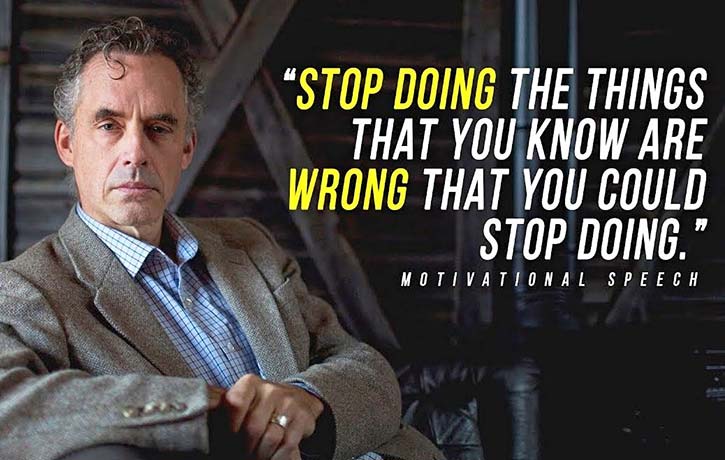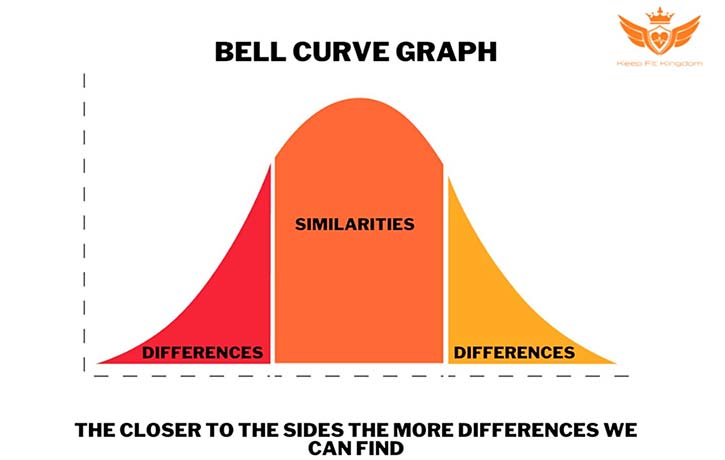
Jordan Peterson is a Canadian psychologist, popular professor and YouTube channel host, who has become well-known for his outspoken opinions regarding free speech, political issues and right wing media.
I have taken his online course called “Discovering Personality”, so I will be reviewing and discussing my interaction and findings with it in this article.
“Everything you value is a product of unimaginably lengthy developmental processes, personal, cultural, biological.” – Jordan B. Peterson.
He has gained an even bigger appeal due to his critiques of political correctness and white privilege, as well as his focus on topics such as white supremacy, cultural Marxism, cognitive dissonance and identity politics.
His focus on Christian psychology and biblical writing are deeply intertwined with his views on modern culture, while he also insists that we look at the faults in our own personalities rather than blame Jesus for them.
Through interviews and lectures Peterson’s appeal has has helped continue to spread awareness of these issues, as well as invite others to look at them from new perspectives. This is why he remains so popular among both religious and non-religious Canadians alike – because he does not shy away from challenging traditional assumptions about political science or cultural values.
Online University
People tend to argue: why do we need this kind of course? Well, the answer is quite simple; Peterson believes we need to understand ourselves and trust me, this is better than blaming your actions because you are “Geminis.”
Companies use these tests and others to get to know possible employees better, how they think and work with colleagues and how they react to authority, among other factors. Another application is in the relationship context; if we understand our partner better, we can avoid pointless arguments and problems and work better together as a team.
Those are just two of the many applications this material has, now let’s focus on the course itself.
In the beginning, Jordan Peterson‘s video and Peterson’s critiques overall explain why some people are not interested in learning more about themselves, and how to interact with others, despite those reasons. One reason perhaps that makes more sense is simply because we just don’t see it.
We Only Perceive What is Relevant to Us
We are inside our own box with our limited knowledge, and we are happy this way because we think we are still alive. Now, imagine how much you could improve your life if you knew what is outside of that box; you would be able to learn when to be open, when to be closed, when to attack and when to defend.
Temperament is Related to Biology and Personality to Context
Let me be clear, we are a mix of everything that is inside of us and the context that surrounds us. Everything is interconnected and interacts upon each other, therefore if each person is different, we can have an almost infinite number of combinations, and why is that important?
Because each person will exceed in something and lack in another thing, if we know what we can do best and what others can do better than us, don’t you think this is more than enough to start working together for and stop fighting with each other? Let me ask you, wouldn’t it be nice to understand yourself a little bit better, to stop senseless pain, suffering and mistakes?
His Model Divides Personality into 5 Areas:
- Openness
- Conscientiousness
- Extraversion
- Agreeableness
- Neuroticism
There are also variations to these. I will also add more traits, information, and context to each personality and division as we progress.
The reason why this test was made was because we are doing things wrong; we are using wrong concepts like “self-esteem” for example (which can be better understood using concepts from this course) and this is because we do not want to go against what is “correct,” perhaps we are scared, even though this means zero scientific advancement.
When looking for measures we must look for patterns and then work with them, and the simpler the better. Once we have a pattern of advancement, it has practical value as it’s convergent with others, and we can also do cross-cultural testing.
All of these Factors make a “Good” Psychometric Model and that is What We’re Looking for
Extraversion
Traits:
- Fun-loving
- Sociable
- Impulsive
- Gambler
- Make eye contact
It’s divided into:

Jordan Petersons clear ideas can get you unstuck
Enthusiasm
Traits:
- Sociable
- Low confidentiality
- Express feelings when happy
- Laugh often
Assertiveness
Traits:
- Take charge
- Strong personality
- Influence people
- Good leader
You might think this should be something positive but, when taken to an extreme, “happiness” can be very dangerous. It can blind us and we are led on by our impulses, we waste money on everything, ie, if it feels good you just do it regardless of the consequences. In other words, you just don’t care about the future, you “spent” the whole present.
IMPORTANT NOTE: Jordan talks a lot about this; we do not want happiness, we want less pain – we want purpose, we want a reason to bear the suffering of the world. That we want to be happy all the time might sound unreasonable and unexpected, but what then is bliss?

Bell Curve Graph applied to people
Neuroticism
Divided into:
Volatility
Traits:
- Touchy
- Easily irritated
- Unstable
- Explosive response
Withdrawal
Traits:
- Prone to anxiety
- Self-conscious
- Depressive
- Overwhelmed
- Freeze response
The meaning of this concept is being more sensitive to negative emotions and knowing this is quite important. People think being “neurotic” is a bad thing or that it refers to being “weak” and “crazy” when they are wrong.
The purpose of emotions is to protect ourselves, think about fear and avoiding specific situations or being more alert and aware because you are scared, your body is ready for fight or flight (maybe freezing) and this can save your life.
What is true, and we must know is that being too neurotic can be dangerous, we must face our fears to grow as people, otherwise we stay stuck and miserable because we are too scared to try, therefore, there is no story to tell…
Something that I like about this course is the section where Jordan talks about depression, and anxiety and the different ways we “treat” them. We give pills and medication to people who lacked care, touch and affection (similar to what Gabor Maté’s discusses in his works).
Jordan mentions something that we must all know. When treating depression, it is important to look at a person’s life situation as a whole – we are more than just our “sick” bodies.
Another detail here, he mentions that anxiety is a marker for pain and that pain is a marker for damage. This is quite insightful to know if we want to go deeper into our own and other people’s behaviour and actions. And to finish this section I would like to make the following comment:
When we face fear and stressful situations we grow, we learn and we adapt so the next time it happens we know what to do, and we’ll have the capacity to do it even better, so we can help ourselves, and help others. Now, what do you think would happen if every single time we felt a bit “stressed” we ran to our closest “safe space”? Reflect on that for a moment.
Agreeableness
Divided into:
Compassion
Traits:
- Feel others’ emotions
- Take time for others
- Have a soft side
Politeness
Traits:
- Respect authority
- Do not take advantage
- Do not believe you’re better than others
Being “agreeable” has plenty of misconceptions in our society; why is it right and why is it wrong? Is caring for everything and everyone right? Or is it better to care for people who need care?Being agreeable means or refers to the balance between your interests and problems and other people’s.
The problem with this and other misunderstandings is that when someone (high in agreeableness) pushes their worries and needs aside for the sake of others, at some point this person will become resentful, and they will present problems with autonomy. On the other hand, the lack of this is seen as predatory behaviour (mostly men).
In Short:
- Low: Crime (bad) – Competition (good).
- High: Maternal care.
A very important key point here is the difference between men and women, which takes us to the next section.
Men and Women
I wrote it in my notes so I’ll share those here too. So, how can something so simple be so hard to understand? Men and women are different, this does not mean one is better than the other, no. We are just different from each other. Let’s look at the following scores and analysis
The Biggest Differences
Women scored higher on agreeableness and neuroticism (a good explanation of this can be that years ago men were the ones hunting and women were the ones collecting food and taking care of the kids, and in times where basically anything can kill you, you had to be alert, especially for the future of the group, ie. your kids).
Women scored more in “positive” aspects (high on agreeableness for example).
There are more similarities between men and women than there are diversities. If you look at a bell curve graph you see the middle represents the similarities with the differences on the side.
Think about the percentage ratios in every single profession – people argue about the lack of women in high-level jobs like engineering but what about the most dangerous jobs which are dominated by men? Are we going to do something about it? There are more men in “women domain” jobs than vice versa, why is that?
Conscientiousness
Divided into:
Industriousness
Traits:
- Carry out my plans
- Do not waste time
- Typically, hard-working
Orderliness
Traits:
- Tidy
- Like routine
- Bothered by messy people
This type of personality associated with work and organizations is one of the best predictors of life success.
An interesting insight here is that “disgust sensitivity” is related to orderliness which refers to bacteria and also social order with it’s socio-political ramifications. For example, conservative people are high on this trait, they like rules and barriers, and are usually, closed to new experiences in comparison to liberals who sometimes show no boundaries.
In the case of disorders, Jordan relates this with anorexia nervosa and obsessive-compulsive disorder where this “disgust” is so high, that it can affect people and take them to unhealthy limits. The last relation is in business, conscientious people tend to fall into implementation and management roles and open people tend to fall into entrepreneurship roles, taking risks and following, larger, potential opportunities.

Jordan Peterson is an influential speaker
To succeed and have a balance, ideally, we need both sets of the above traits
Openness to Experience
Divided into:
Intellect
Traits:
- Reasoning and understanding objectively, especially regarding abstract matters
- Highly adaptable
- Sceptical
Openness
Traits:
- Open-minded
- Imaginative
- Creative
This type of personality is closely linked with IQ and creativity. People high on openness are into art and philosophical discussions. When talking about art, they mention the beauty and history behind it. They tend to solve complex problems. There are two concepts we must discuss before getting to the conclusions of the course. When talking about creativity, Jordan mentions the following:
Creativity is the ability to generate a diverse range of ideas which are original, and practical. But most people are not creative, we tend to use this concept wrongly. When we talk about IQ, Jordan mentions and discusses that the richer and more egalitarian a society becomes, the more IQ differences are determined by biological factors.
He also shows concern about the IQ topic and the different outcomes a person can have depending on how high or low their IQ is.
Conclusion
We must understand that this course is an aid to helping us understand ourselves and other people a little bit better. I’m not saying it’s perfect by any means, as there is a whole paradigm that we could look at to really blow things out of the water! But despite these potential issues, this course seems more analytical and comprehensive than others.
This course helped me understand myself more and I’m sure it will probably do the same for you. It teaches you at core that, we are all similar, but different at the same time, and we should do our best to understand and celebrate that.
Common FAQ’s
How Much Does Jordan Peterson Charge for Speeches?
Just in case you were wondering, Jordan’s booking fees range from around $75,000-$150,000. His speaking fees may vary from those often shown for performing and appearing. (Note that popularity, career stage, and current demand also affect speaking rates.)
How long is a Typical Jordan Peterson Show?
Jordan Peterson shows may vary slightly in length, but will generally run for between 90- minutes to two hours.
You can find out more about Jordan’s course “Discovering Personality” and order it here, and you might also find this free Big 5 Inventory (BFI) personality test that provides results and scores helpful too!
What did you think about the interviews above with Joe Rogan left speechless by Peterson’s views on the history of the Bible? Let us know in the comments below and join in the conversation on Facebook, Twitter & Instagram.









